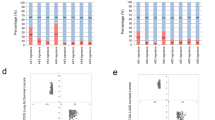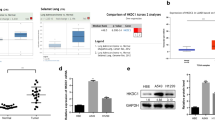Abstract
Objective
Recent studies have shown that the metabolic process-related gene AHSG is involved in multiple pathological processes of tumours. This study will explore the relationship between AHSG and lung adenocarcinoma.
Materials and methods
Expression analysis, survival analysis and co-expression analysis of AHSG were performed using a public database, and cytological and molecular biology assays were performed to explore the role of AHSG in lung adenocarcinoma.
Result
Compared with normal tissues, AHSG expression was significantly higher in cancer tissues in the TCGA-LUAD database, and pan-cancer analysis revealed abnormal AHSG expression in different kinds of tumours. Survival analysis revealed that compared with the low expression group, the patients in the high expression group had a significantly worse overall survival duration in the TCGA-LUAD database, and a subsequent study confirmed that AHSG expression could be an independent prognostic factor of overall survival in lung adenocarcinoma. AHSG-related genes are involved in multiple physiological and pathophysiological pathways. In subsequent cytological and molecular biology experiments, inhibition of AHSG expression suppressed proliferation, migration and invasion in lung adenocarcinoma cell lines, and the EMT process was blocked after knockdown of AHSG.
Conclusion
AHSG could be used as a prognostic factor for OS in patients with lung adenocarcinoma. It can promote the biological behaviour of lung adenocarcinoma and may become a potential target for treatment, which is worthy of further study.




Similar content being viewed by others
Data availability
Some results in this study are based upon data generated by the TCGA Research Network: [https://www.cancer.gov/tcga] and the human protein atlas database [https://www.proteinatlas.org/].
The data used in this study can be acquired for free via:
Cbioportal browser [http://www.cbioportal.org/].
UALCAN browser [http://ualcan.path.uab.edu/analysis.html].
UCSC XENA browser [https://xenabrowser.net/].
References
Sung H, Ferlay J, Siegel RL, Laversanne M, Soerjomataram I, Jemal A (2021) Bray. Global Cancer Statistics 2020: GLOBOCAN estimates of incidence and Mortality Worldwide for 36 cancers in 185 countries. Ca Cancer J Clin 71(3):209–249
Lung Cancer Incidence (2019) And Mortality with Extended follow-up in the National Lung Screening Trial. J Thorac Oncol 14(10):1732–1742
Deval JC, Benito MB, Cuesta JCP, Pérez EM, Contreras SS, Mojarrieta JC, Quevedo KA, Martínez MA (2022) E. Arana. [Translated article] Lung Cancer Screening: Survival in an extensive early detection program in Spain (I-ELCAP). Arch Bronconeumol,
Swanton C, Govindan R (2016) Clinical implications of genomic Discoveries in Lung Cancer. N Engl J Med 374(19):1864–1873
Pal D, Dasgupta S, Kundu R, Maitra S, Das G, Mukhopadhyay S, Ray S, Majumdar SS (2012) Bhattacharya. Fetuin-A acts as an endogenous ligand of TLR4 to promote lipid-induced insulin resistance. Nat Med 18(8):1279–1285
Stefan N, Hennige AM, Staiger H, Machann J, Schick F, Kröber SM, Machicao F, Fritsche A (2006) Häring. Alpha2-Heremans-Schmid glycoprotein/fetuin-A is associated with insulin resistance and fat accumulation in the liver in humans. Diabetes Care 29(4):853–857
Dabrowska AM, Tarach JS, Wojtysiak-Duma B, Duma D (2015) Fetuin-A (AHSG) and its usefulness in clinical practice. Review of the literature. Biomed Pap Med Fac Univ Palacky Olomouc Czech Repub 159(3):352–359
Nimptsch K, Aleksandrova K, Boeing H, Janke J, Lee YA, Jenab M, Kong SY, Tsilidis KK, Weiderpass E, Bueno-De-Mesquita HB, Siersema PD, Jansen EH, Trichopoulou A, Tjønneland A, Olsen A, Wu C, Overvad K, Boutron-Ruault MC, Racine A, Freisling H, Katzke V, Kaaks R, Lagiou P, Trichopoulos D, Severi G, Naccarati A, Mattiello A, Palli D, Grioni S, Tumino R, Peeters PH, Ljuslinder I, Nyström H, Brändstedt J, Sánchez MJ, Gurrea AB, Bonet CB, Chirlaque MD, Dorronsoro M, Quirós JR, Travis RC, Khaw KT, Wareham N, Riboli E, Gunter MJ (2015) Pischon. Plasma fetuin-A concentration, genetic variation in the AHSG gene and risk of colorectal cancer. Int J Cancer 137(4):911–920
Shi F, Wu H, Qu K, Sun Q, Li F, Shi C, Li Y, Xiong X, Qin Q, Yu T, Jin X, Cheng L, Wei Q, Li Y, She J (2018) Identification of serum proteins AHSG, FGA and APOA-I as diagnostic biomarkers for gastric cancer. Clin Proteom 15:18
Bindea G, Mlecnik B, Hackl H, Charoentong P, Tosolini M, Kirilovsky A, Fridman WH, Pages F, Trajanoski Z, Galon J (2009) ClueGO: a Cytoscape plug-in to decipher functionally grouped gene ontology and pathway annotation networks. Bioinformatics 25(8):1091–1093
Shannon P, Markiel A, Ozier O, Baliga NS, Wang JT, Ramage D, Amin N, Schwikowski B, Ideker T (2003) Cytoscape: a software environment for integrated models of biomolecular interaction networks. Genome Res 13(11):2498–2504
Jiang XC, Liang ZD, Chen DL, Jia JP, Hu JR, Hu L (2021) Correlation of Homocysteine, AHSG, CRP with insulin resistance, 25-(OH)2-VitD, blood lipids in gestational diabetes patients. Clin Lab, 67 (2)
Goustin AS, Abou-Samra AB (2011) The “thrifty” gene encoding Ahsg/Fetuin-A meets the insulin receptor: insights into the mechanism of insulin resistance. Cell Signal 23(6):980–990
Goustin AS, Derar N, Abou-Samra AB (2013) Ahsg-fetuin blocks the metabolic arm of insulin action through its interaction with the 95-kD β-subunit of the insulin receptor. Cell Signal 25(4):981–988
Tariq A, Asghar A, Alam F, Fatima SS (2018) AHSG rs4918 polymorphism poses a weak predisposition to insulin resistance during pregnancy. J Pak Med Assoc 68(5):698–701
Andersen G, Burgdorf KS, Sparsø T, Borch-Johnsen K, Jørgensen T, Hansen T, Pedersen O (2008) AHSG tag single nucleotide polymorphisms associate with type 2 diabetes and dyslipidemia: studies of metabolic traits in 7,683 white danish subjects. Diabetes 57(5):1427–1432
Mohammadi-Noori E, Salehi N, Mozafari H, Elieh Ali Komi D, Saidi M, Bahrehmand F, Vaisi-Raygani A, Elahirad S, Moini A (2020) A. Kiani. Association of AHSG gene polymorphisms with serum Fetuin-A levels in individuals with cardiovascular calcification in west of Iran. Mol Biol Rep 47(3):1809–1820
Rittenberg B, Partridge E, Baker G, Clokie C, Zohar R, Dennis JW (2005) Tenenbaum. Regulation of BMP-induced ectopic bone formation by Ahsg. J Orthop Res 23(3):653–662
Lavebratt C, Wahlqvist S, Nordfors L, Hoffstedt J, Arner P (2005) AHSG gene variant is associated with leanness among swedish men. Hum Genet 117(1):54–60
Müssig K, Staiger H, Machicao F, Machann J, Hennige AM, Schick F, Claussen CD, Fritsche A (2009) Häring, N. Stefan. AHSG gene variation is not associated with regional body fat distribution–a magnetic resonance study. Exp Clin Endocrinol Diabetes 117(8):432–437
Thompson PD, Sakwe A, Koumangoye R, Yarbrough WG, Ochieng J, Marshall DR (2014) Alpha-2 Heremans Schmid glycoprotein (AHSG) modulates signaling pathways in head and neck squamous cell carcinoma cell line SQ20B. Exp Cell Res 321(2):123–132
Dalamaga M, Polyzos SA, Karmaniolas K, Chamberland J, Lekka A, Migdalis I, Papadavid E, Dionyssiou-Asteriou A (2014) Mantzoros. Circulating fetuin-A in patients with pancreatic cancer: a hospital-based case-control study. Biomarkers 19(8):660–666
Ochieng J, Nangami G, Sakwe A, Moye C, Alvarez J, Whalen D, Thomas P (2018) P. Lammers. Impact of Fetuin-A (AHSG) on Tumor Progression and Type 2 diabetes. Int J Mol Sci, 19 (8)
Ochieng J, Korolkova OY, Li G, Jin R, Chen Z, Matusik RJ, Adunyah S, Sakwe AM (2022) O. Ogunkua. Fetuin-A promotes 3-Dimensional growth in LNCaP prostate Cancer cells by sequestering Extracellular vesicles to their surfaces to Act as Signaling Platforms. Int J Mol Sci, 23 (7)
Ö Güzel A, Kösem Y, Aslan A, Asfuroglu M, Balci C, Senel A, Tuncel (2021) The role of Pentraxin-3, Fetuin-A and Sirtuin-7 in the diagnosis of prostate Cancer. Urol J 19(3):196–201
Hopkins BD, Goncalves MD, Cantley LC (2020) Insulin-PI3K signalling: an evolutionarily insulated metabolic driver of cancer. Nat Rev Endocrinol 16(5):276–283
Nangami GN, Sakwe AM, Izban MG, Rana T, Lammers PE, Thomas P, Chen Z (2016) Ochieng. Fetuin-A (alpha 2HS glycoprotein) modulates growth, motility, invasion, and senescence in high-grade astrocytomas. Cancer Med 5(12):3532–3543
Kundranda MN, Henderson M, Carter KJ, Gorden L, Binhazim A, Ray S, Baptiste T, Shokrani M, Leite-Browning ML, Jahnen-Dechent W, Matrisian LM (2005) Ochieng. The serum glycoprotein fetuin-A promotes Lewis lung carcinoma tumorigenesis via adhesive-dependent and adhesive-independent mechanisms. Cancer Res 65(2):499–506
Guillory B, Sakwe AM, Saria M, Thompson P, Adhiambo C, Koumangoye R, Ballard B, Binhazim A, Cone C, Jahanen-Dechent W (2010) Ochieng. Lack of fetuin-A (alpha2-HS-glycoprotein) reduces mammary tumor incidence and prolongs tumor latency via the transforming growth factor-beta signaling pathway in a mouse model of breast cancer. Am J Pathol 177(5):2635–2644
Acknowledgements
We gratefully acknowledge the assistance of Hebei Medical University, from which we obtained the cell line in our study.
Author information
Authors and Affiliations
Contributions
Xiaoying Xing has designed the study, finished the expriment and drafted the manuscript. Fumin Cao and Liping Gao have designed the study and analyzed the data. Minglei Song revised the manuscript and submitted the manuscript.
Corresponding author
Ethics declarations
Conflict of interest
The authors declare that the research was conducted in the absence of any commercial or financial or non-financial relationships that could be construed as a potential conflict of interest.
Ethical approval
This article does not contain any studies with human participants or animals performed by any of the authors.
Additional information
Publisher’s Note
Springer Nature remains neutral with regard to jurisdictional claims in published maps and institutional affiliations.
Electronic supplementary material
Below is the link to the electronic supplementary material.
Rights and permissions
Springer Nature or its licensor (e.g. a society or other partner) holds exclusive rights to this article under a publishing agreement with the author(s) or other rightsholder(s); author self-archiving of the accepted manuscript version of this article is solely governed by the terms of such publishing agreement and applicable law.
About this article
Cite this article
Xing, X., Cao, F., Gao, L. et al. AHSG, a Gene Promoting Tumour Proliferation, Migration and Invasion, is an Independent Prognostic Factor for Poor Overall Survival in Lung Adenocarcinoma. Mol Biol Rep 50, 7659–7666 (2023). https://doi.org/10.1007/s11033-023-08623-x
Received:
Accepted:
Published:
Issue Date:
DOI: https://doi.org/10.1007/s11033-023-08623-x




